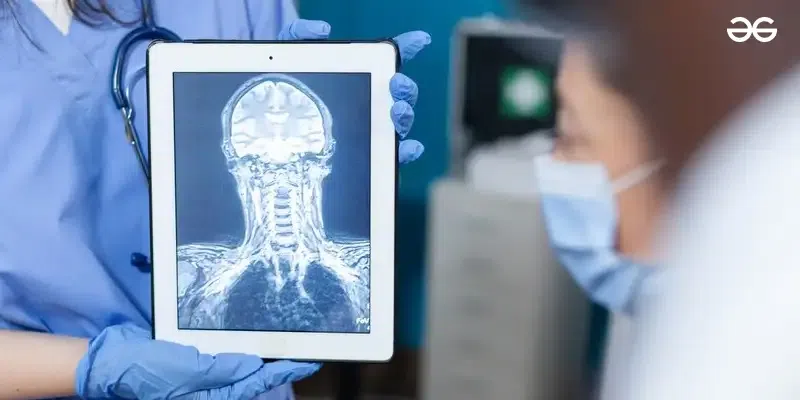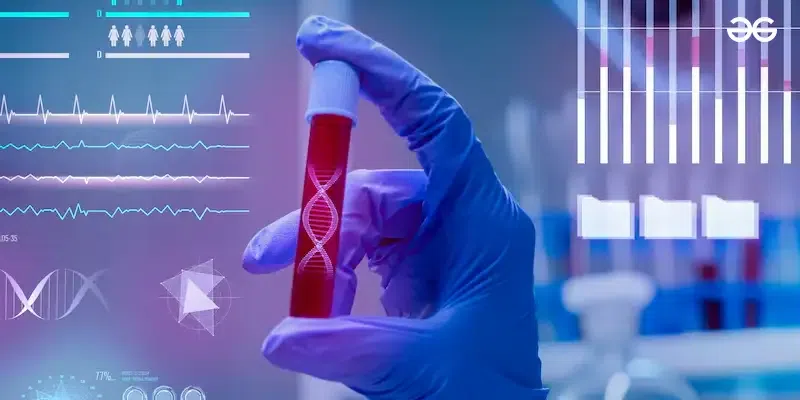
|
|
Machine Learning is a branch of Artificial Intelligence that helps computers learn and understand the data and recognize trends to make future predictions. ML uses algorithms that allow computers to identify patterns, make predictions, and derive insights from data, much like humans learn from experience. Machine Learning plays an important role in the Healthcare Sector helping researchers and doctors identify important trends in the patient’s history and make valuable decisions before the disease spreads or reaches the last stage, it also helps in identifying the disease and its causes accurately. In this article, we will understand how machine learning will play an important role in healthcare in 2024 in various ways. Machine Learning for Healthcare
Introduction to Machine Learning for HealthcareAs we move into the future in recent years, machine learning has become a major facilitator of the healthcare sector, tackling the complex issues that have remained for a long time. Revolutionized Indian Economy due to Digital progress has played a major part in strengthening the Integration and Adoption of AI, Machine Learning, and Data science. From Electronic Health Records (EHRs) and medical imaging systems to genomic sequencing, progress of wearable sensor technologies by ML provides a comprehensive analysis of the very early stages of disease and prompting of preventive measures. The health care scenario is all set to undergo a complete revolution, thanks to developments in machine learning/data science (ML/DS) and AI, as we transition from personalised medicine and early disease detection to drug discovery and remote patient monitoring, within a framework of precision medicine, predictive analytics, and patient-centered care. Role of ML in HealthcareMachine learning which is revolutionizing in healthcare is able to make clinical change tasks such as for diagnosis and treatment ruling. By the means of processing large-scale medical data, ML algorithms may determine patterns and show doctors their disease in images and tests through the predicting process which consequently may be of great worth. This not only proves to be very beneficial for not only improving the diagnostic accuracy but also the plan of treatment which is unique to the patient. In addition to this, ML can automate tedious tasks that are time-consuming hence enabling medical professionals to attend to more issues being brought forth by patients and those that require their close attention. Need of ML in Healthcare in 2024ML has been an important part of the Healthcare domain and now it works diversly in 2024. Some of the uses of ML in healthcare are mentioned below:
Top Uses of Machine Learning, Data Science, and AI in Healthcare Machine Learning for Healthcare 1. Enhanced Medical ImagingMachine Learning Algorithms are widely used in the real world for image segmentation, classification, and anomaly detection. 2024 is also the year for advancement in convolutional neural networks (CNNs) which helps in diagnostic processes since it provides high accuracy and efficiency. ML functions help in the early detection of cancer, cardiovascular diseases, and neurological conditions. The MRI and CT scan of a patient provides knowledge about the condition of the patient and ML-powered technologies also help in dealing with these serious diseases at early stages. For example, This technology also helped Massachusetts General Hospital analyze MRI images and accurately predict the development of Alzheimer’s disease up to six years in advance helping in early medical treatment. The researchers used deep learning to fit the model and study the MRI of the brain. These early detections not only help researchers and doctors prevent the disease from spreading but it also helps in taking accurate steps to cure it.  Enhanced Medical Imaging 2. Predictive Analytics and Disease PreventionMachine Learning plays an important role in studying the data available for a certain disease and the patients associated with it. It tries to recognize the trends in patients’ medical history, lifestyle changes, and choices, genetic information, etc. The models we fit in machine learning identify trends in these datasets and predict the possible outcomes of diseases. Recent researchers have identified that ML algorithms can predict diabetic retinopathy progression based on retinal images. This technology has been in use for a long time the Geisinger Health System in Pennsylvania implemented a predictive analytics program to identify patients at high risk of sepsis and in 2024 this technology can help thousands of people identify and forecast diseases at early stages and bring accurate preventive measures to save lives.
 Predictive Analytics and Disease Prevention 3. Personalized MedicineML-powered decision systems and personalized prediction help management for individual patient based on their medical history, genetic makeup, biomarkers, and clinical profiles. Algorithms of machine learning study the complex data and suggest the best set of medicines for the patient based on their hath conditions. The proper study of all the aspects of clinical treatment also reduces the possibility of adverse effects. For example, IBM Watson for Oncology utilizes natural language processing(NLP) and machine learning to provide personalized treatment recommendations for cancer patients. ML is widely used to improve the treatment of cancer patients as pharmacogenomic models have helped in the targeted treatment improving the survival rate and quality of life.
 Personalized Medicine 4. Remote Patient MonitoringAfter the COVID pandemic, remote patient monitoring became famous and Machine Learning algorithms are used in it to detect and analyze patient’s conditions timely and regularly. Many companies have now started using ML models to check on patients’ health and give signs of early deterioration and timely interventions to reduce hospital readmissions. These models help us doctors in monitoring the patients by taking proper measures of maintaining distance. As well as there are technologies that are growing for telemedicine that provide personalized health recommendations and facilitate remote consultations with healthcare providers.
 Remote Patient Monitoring 5. Drug TestingML models can go through a wide range of data and complex data sets including genomics, proteomics, and transcriptomics identifying the drug associated with a particular disease and its symptoms. ML models can also predict the likelihood of adverse drug reactions and toxicity based on chemical structure. It also helps in building a chemical library that can help identify details about the promising drug as well as it helps in virtual screening of the chemical library. ML models can also identify toxic drugs and suggest a selection of safer drugs for a particular patient based on the patient’s history and medical condition.
 Drug Testing 6. Mental HealthBy integrating patient-specific information with evidence-based guidelines and clinical expertise, ML-driven decision support systems can assist clinicians in selecting optimal interventions, medication dosages, and therapy modalities for each patient. ML models help in identifying these patterns at an early stage. Multiple ML-powered sources provide specific therapy to the patients making it cost effective and increasing the availability of treatment to everyone. It can also help understand the patterns of public health based on the factors present bring preventive measures and promote mental health awareness and education for the same. It also helps in reducing the stigma that we still have regarding mental health in 2024.
 Mental Health 7. Ethical and Regulatory ConsiderationsWhile Machine Learning is growing rapidly in the medical sector it is also important to address that medical history and personal information of the patient is to be kept private and should not be misused. The collaborative work between data scientists, clinicians, ethicists, and policymakers should follow the guidelines and protect the privacy of an individual. Machine Learning is a powerful tool in 2024 revolutionizing the medical domain and bringing effective research saving thousands of lives and it also helps in preventive measures. These ML-powered facilities and technologies also make treatment accessible to the large and needy.
 Ethical and Regulatory Considerations Application of Machine Learning in Healthcare:Machine Learning and AI are widely used in the healthcare sector, some of them are discussed below:
What Are the Benefits of Machine Learning for Healthcare ProvidersMedical machine learning (ML) provides variety of opportunities for healthcare service providers in transformation of the way they deliver care:
Health Ethics of Machine Learning Applications in MedicineMachine learning (ML) has the potential to improve healthcare, although ethical issues around this advancement are numerous. Bias and Fairness
Privacy and Security
Transparency and Explainability
Over-reliance and Job Displacement
No-Code Machine LearningLimited coding and Machine Learning knowledge shouldn’t be an obstacle to using these high technologies in our healthcare sector. In the healthcare sector, the adoption of no-code ML platforms is driving significant growth and innovation by empowering healthcare professionals, researchers, and organizations to leverage data-driven insights and AI-driven solutions to improve patient care, optimize clinical workflows, and drive operational efficiency. Here’s how no-code ML is affecting the growth of healthcare:
ConclusionIn this article, we discussed the potential of Machine Learning, AI and Data science in the Healthcare and how people who do not know advanced coding can benefit from it. ML is rapidly increasing and helping researchers and doctors in making health services more affective and advanced recognizing potential threat of disease and its cure at early stages. Machine Learning for Healthcare in 2024 – FAQ’sWhat is machine learning, and how is it used in healthcare?
What are some examples of machine learning applications in medical imaging?
How does machine learning contribute to personalized medicine?
What are some challenges associated with implementing machine learning in mental health care?
What is no-code machine learning, and how does it differ from traditional machine learning?
|
Reffered: https://www.geeksforgeeks.org
| AI ML DS |
| Related |
|---|
| |
| |
| |
| |
| |
Type: | Geek |
Category: | Coding |
Sub Category: | Tutorial |
Uploaded by: | Admin |
Views: | 15 |